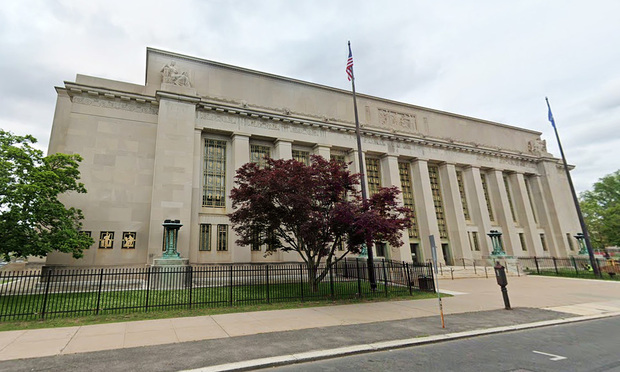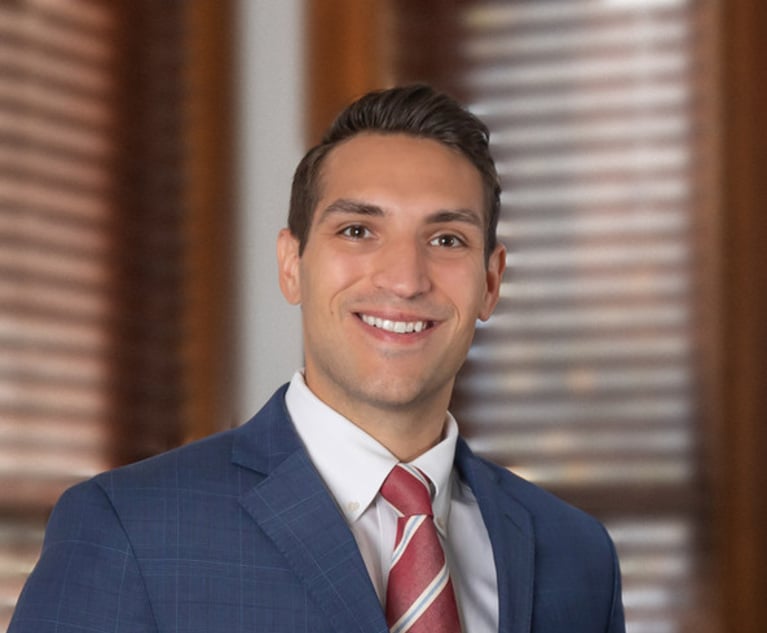Justice Delayed? Lawyers Brace for Impact of 3-Month Continuances Amid Coronavirus Precautions
The court will automatically grant requests for continuances, of up to three months, that are based on coronavirus precautions.
March 13, 2020 at 01:45 PM
4 minute read
 Hartford Superior Court, in Hartford. Photo: Google
Hartford Superior Court, in Hartford. Photo: Google
Civil and criminal litigators who practice in Hartford Superior Court expressed support—but are concerned about the ripple effects—of an order from Hartford Superior Court Administrative Judge David Sheridan, requiring conference calls and delaying trials for up to three months in the wake of concerns over COVID-19.
In his Wednesday two-page directive, Sheridan ordered that—beginning Friday—all pretrial conferences, status conferences and trial managements conferences would be conducted over the phone until further notice. He also said requests for continuance for up to three months—that are based on legitimate concerns over exposure to the virus—will "be automatically granted."
On Thursday, the court announced all new Connecticut federal and superior court civil and criminal trials would be delayed until April 13.
While many attorneys expressed support over having conferences via phone, with some even arguing this should be a permanent policy, others questioned what the delay could mean.
"A three-month continuance is going to limit access to the courts from now, through the end of the year, as it will disrupt the calendar of almost all civil litigators," said attorney Peter Bowman of Stratford-based Billings, Barrett & Bowman. "Further, I am concerned that insurance companies will use this as an excuse to kick this down the road, instead of conducting an appropriate settlement assessment of our client's needs. I believe we will see less depositions, less court hearings and less trials, which will result in less settlements and delayed justice for our clients."
Sheridan declined to be interviewed for this story.
RisCassi & Davis attorney John Houlihan Jr. said that while he is not critical of Sheridan's mandate on the three-month continuance, he felt "there may be a need to do a total restructuring of the dockets as a result."
"They may blow out three months of dockets, and where will those cases go?" Houlihan asked. "There will be a big ripple effect. The courthouse will have to work hard to get those cases back on the docket without already disrupting cases already set for three months out. I do understand, though, it's a necessary evil."
Attorneys embraced the mandate of having pretrial conferences, status conferences and trial management conferences held via telephone.
"I think that there are many times when a conference or an argument could be done virtually, and it would make the whole process easier for lawyers and the court," said Paul Knag, a partner at Murtha Cullina in Stamford. "This is a good time to experiment with it, and see how it goes."
Knag said he sees no downside to the virtual conferences, with the exception of a settlement conference, which he said, "does not work by phone. It's important for the parties to interface with their lawyers separately, and then sometimes with the judge separately and that's difficult to facilitate by phone."
Chris Kriesen, founder and principal at Hartford-based The Kalon Law Firm, said the conference policy should continue even after fears of the virus subsides.
"Some of these measures should remain in place to take advantage of technology, and increase the efficiency of the court," he said Friday. "The federal courts already do state conferences and pretrials by phone. There is no need for lawyers to be driving all over the state to get to court for a short matter."
Hartford-based employment attorney Rick Hayber agreed, saying, "They should have gone to teleconferences for status conferences a long time ago."
Related stories:
You Won't Be Able to Enter CT's Federal Courthouses If You Visited These Places Recently
Coronavirus Is Slowing Courts. But What About the Right to a Speedy Trial?
As Coronavirus Threat Grows, More Courts Curb Access and Limit Oral Arguments
This content has been archived. It is available through our partners, LexisNexis® and Bloomberg Law.
To view this content, please continue to their sites.
Not a Lexis Subscriber?
Subscribe Now
Not a Bloomberg Law Subscriber?
Subscribe Now
NOT FOR REPRINT
© 2025 ALM Global, LLC, All Rights Reserved. Request academic re-use from www.copyright.com. All other uses, submit a request to [email protected]. For more information visit Asset & Logo Licensing.
You Might Like
View All

Apple Disputes 'Efforts to Manufacture' Imaging Sensor Claims Against iPhone 15 Technology
Law Firms Mentioned
Trending Stories
- 1'A Death Sentence for TikTok'?: Litigators and Experts Weigh Impact of Potential Ban on Creators and Data Privacy
- 2Bribery Case Against Former Lt. Gov. Brian Benjamin Is Dropped
- 3‘Extremely Disturbing’: AI Firms Face Class Action by ‘Taskers’ Exposed to Traumatic Content
- 4State Appeals Court Revives BraunHagey Lawsuit Alleging $4.2M Unlawful Wire to China
- 5Invoking Trump, AG Bonta Reminds Lawyers of Duties to Noncitizens in Plea Dealing
Who Got The Work
J. Brugh Lower of Gibbons has entered an appearance for industrial equipment supplier Devco Corporation in a pending trademark infringement lawsuit. The suit, accusing the defendant of selling knock-off Graco products, was filed Dec. 18 in New Jersey District Court by Rivkin Radler on behalf of Graco Inc. and Graco Minnesota. The case, assigned to U.S. District Judge Zahid N. Quraishi, is 3:24-cv-11294, Graco Inc. et al v. Devco Corporation.
Who Got The Work
Rebecca Maller-Stein and Kent A. Yalowitz of Arnold & Porter Kaye Scholer have entered their appearances for Hanaco Venture Capital and its executives, Lior Prosor and David Frankel, in a pending securities lawsuit. The action, filed on Dec. 24 in New York Southern District Court by Zell, Aron & Co. on behalf of Goldeneye Advisors, accuses the defendants of negligently and fraudulently managing the plaintiff's $1 million investment. The case, assigned to U.S. District Judge Vernon S. Broderick, is 1:24-cv-09918, Goldeneye Advisors, LLC v. Hanaco Venture Capital, Ltd. et al.
Who Got The Work
Attorneys from A&O Shearman has stepped in as defense counsel for Toronto-Dominion Bank and other defendants in a pending securities class action. The suit, filed Dec. 11 in New York Southern District Court by Bleichmar Fonti & Auld, accuses the defendants of concealing the bank's 'pervasive' deficiencies in regards to its compliance with the Bank Secrecy Act and the quality of its anti-money laundering controls. The case, assigned to U.S. District Judge Arun Subramanian, is 1:24-cv-09445, Gonzalez v. The Toronto-Dominion Bank et al.
Who Got The Work
Crown Castle International, a Pennsylvania company providing shared communications infrastructure, has turned to Luke D. Wolf of Gordon Rees Scully Mansukhani to fend off a pending breach-of-contract lawsuit. The court action, filed Nov. 25 in Michigan Eastern District Court by Hooper Hathaway PC on behalf of The Town Residences LLC, accuses Crown Castle of failing to transfer approximately $30,000 in utility payments from T-Mobile in breach of a roof-top lease and assignment agreement. The case, assigned to U.S. District Judge Susan K. Declercq, is 2:24-cv-13131, The Town Residences LLC v. T-Mobile US, Inc. et al.
Who Got The Work
Wilfred P. Coronato and Daniel M. Schwartz of McCarter & English have stepped in as defense counsel to Electrolux Home Products Inc. in a pending product liability lawsuit. The court action, filed Nov. 26 in New York Eastern District Court by Poulos Lopiccolo PC and Nagel Rice LLP on behalf of David Stern, alleges that the defendant's refrigerators’ drawers and shelving repeatedly break and fall apart within months after purchase. The case, assigned to U.S. District Judge Joan M. Azrack, is 2:24-cv-08204, Stern v. Electrolux Home Products, Inc.
Featured Firms
Law Offices of Gary Martin Hays & Associates, P.C.
(470) 294-1674
Law Offices of Mark E. Salomone
(857) 444-6468
Smith & Hassler
(713) 739-1250












